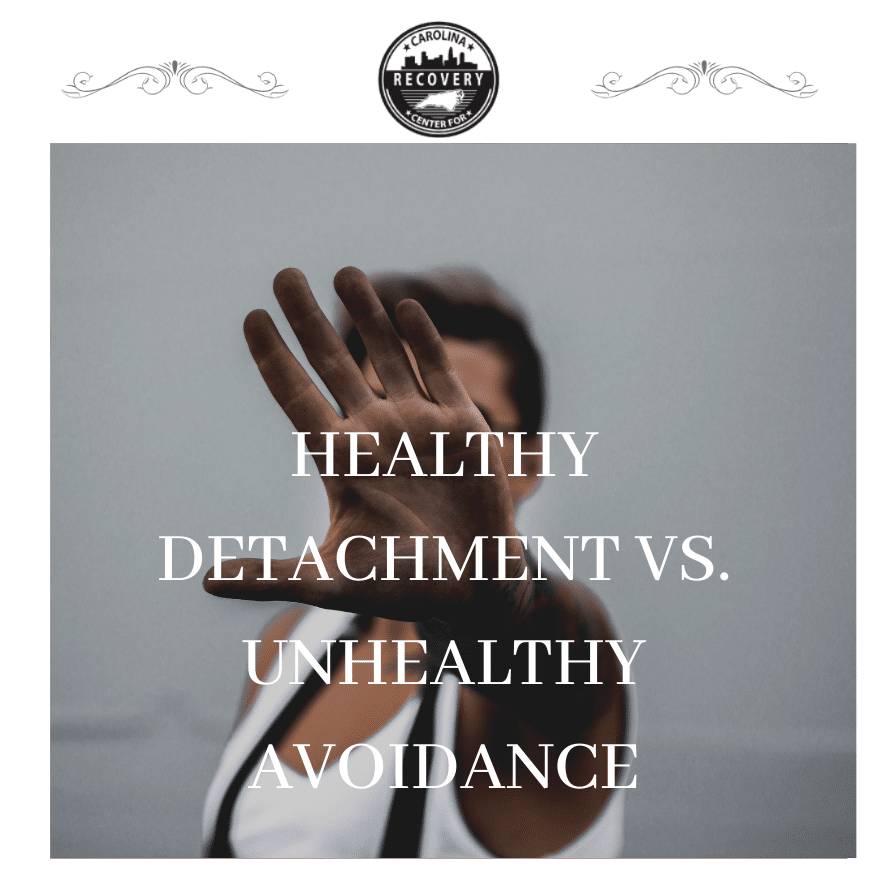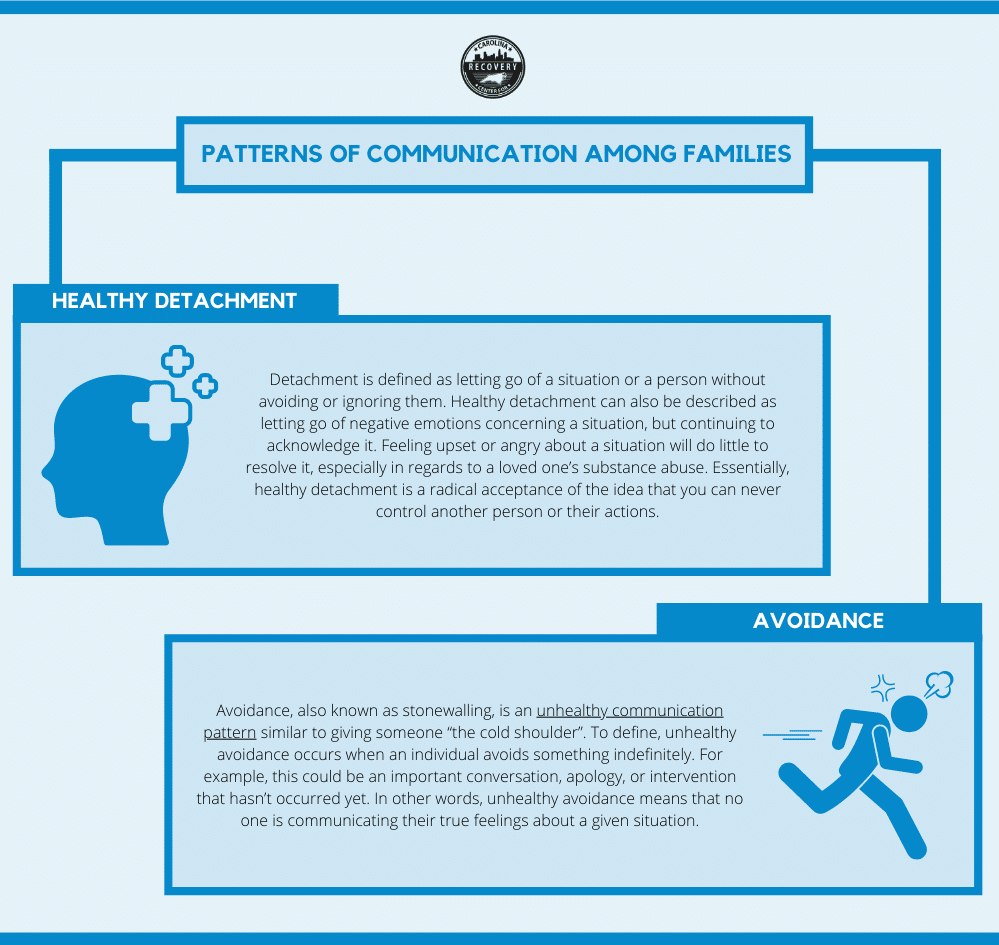Healthy Detachment vs. Unhealthy Avoidance

Medically Verified: 2/1/24
Medical Reviewer
Chief Editor

All of the information on this page has been reviewed and verified by a certified addiction professional.
Healthy detachment and unhealthy avoidance are terms related to patterns of communication among families. Typically, substance abuse disorder affects not only the addict but their families as well. Oftentimes, the communication between family members and their addicted loved one become damaged. Additionally, during times of chronic stress, there are healthy and unhealthy ways to communicate. Most individuals communicate in an unhealthy manner during active-addiction. As a result, learning the difference between healthy detachment and unhealthy avoidance is vital for one’s success. Relationships and quality of communication between your family members will improve despite the negative effects of your addiction by recognizing and addressing these issues.
Communicating as a Family
Communicating as a family is difficult when a family member suffers from addiction. While the addict’s brain believes it cannot be without a substance, the family members’ brains will create negative behaviors and thought patterns as a result of their loved one’s behavior. This is why addiction is commonly referred to as a family disease. Dealing with the effects of a loved one’s addiction is extremely difficult. However, learning how to communicate in a healthy manner can help repair relationships between family members.
During any family discussion, it is extremely important for individuals to avoid escalation and conflict. De-escalation allows individuals to avoid causing their loved ones to become defensive or on edge during a conversation. This is extremely important to families who have dealt with the effects of addiction.
Without de-escalation, discussions can quickly turn into unhealthy avoidance behaviors such as anger, stonewalling, and blaming. As the name suggests, these behaviors lead to unhealthy avoidance behaviors rather than healthy communication. In other words, staying calm while addressing a loved one who is refusing to get help will be more effective than slamming a door. To explain further, the way you react to a situation will make the difference between a productive conversation and an unhealthy argument. Depending on how you react, it will either lead you to healthy detachment or unhealthy avoidance.
Healthy Detachment vs. Avoidance

Detachment and avoidance are two very different concepts, however, they may appear similar. Avoidance, also known as stonewalling, is an unhealthy communication pattern similar to giving someone “the cold shoulder”. To define, unhealthy avoidance occurs when an individual avoids something indefinitely. For example, this could be an important conversation, apology, or intervention that hasn’t occurred yet. In other words, unhealthy avoidance means that no one is communicating their true feelings about a given situation.
On the other hand, healthy detachment is defined as letting go of a situation or a person without avoiding or ignoring them. Healthy detachment can also be described as letting go of negative emotions concerning a situation, but continuing to acknowledge it. Feeling upset or angry about a situation will do little to resolve it, especially in regards to a loved one’s substance abuse. Essentially, healthy detachment is a radical acceptance of the idea that you can never control another person or their actions.
Unhealthy Avoidance: How to Avoid it
Unhealthy avoidance looks very similar to a family sitting silently at a dinner table rather than communicating. The combination of silence and heavy tension in the air accurately describes a picture of unhealthy avoidance among a family. Unhealthy avoidance can be a severe issue among families affected by addiction. This is because it cuts off communication between the addict and their loved ones. It is vital to learn how to stop unhealthy avoidance before it begins.
Unhealthy avoidance can be difficult to stop. However, with teamwork and honest communication, your family can put an end to unhealthy avoidance today.
The first step in ending unhealthy avoidance is to pause conversations before they become too heated. For example, if your family is hosting an intervention and tensions have become high, take a break. In other words, whoever said “don’t go to bed angry” was wrong. In fact, you should table a heated conversation until the next day – once tensions have died down. Additionally, try to remember that topics such as addiction, dual diagnosis disorders, and interpersonal damage, may be too difficult for some to discuss. Allow each family member time to cool off while re-evaluating their thoughts and feelings on the conversation.
Lastly, families affected by addiction often benefit from attending dialectical behavior therapy (DBT), a form of psychotherapy utilized in addiction treatment. This form of therapy is known to help individuals learn radical acceptance, communication skills, and self-soothing exercises.
Healthy Detachment
Contrary to unhealthy avoidance, healthy detachment is the act of stepping back from a situation. Also, it is synonymous with focusing on the bigger problem at hand, rather than proving you are right. While it is hard not to take things personally, individuals must remember that both the addict and their family members’ brains are on survival mode. Unfortunately, the behaviors individuals display during active-addiction create an unsafe mental environment for the family. However, healthy detachment allows families to repair the damage caused by substance use disorder.
Avoidance skews our perspective, opens us up to hurt, and places us in a continuous state of anxiety. On the other hand, detachment is necessary when dealing with individuals suffering from addiction.
Oftentimes, being able to let go of negative feelings associated with a loved one’s addiction allows family members to heal. Additionally, healthy detachment allows families to rebuild relationships despite any negative feelings from the past. Healthy detachment is the act of family members accepting that they cannot control their addicted loved ones. In other words, family members separate their love for the addicted individual from their fear and guilt concerning their addiction.
Addiction Treatment at Carolina Recovery Center
Addiction is a complex disease, creating disaster among many families in the United States. If you or a loved one suffer from addiction, the time to seek help is now. Addiction can make individuals feel lonely, however, recovery doesn’t have to be.
“Family owned and operated, we take pride in our commitment to healing families as a whole. Recovery is not only for those who have abused drugs and alcohol but also for those who have suffered the trauma of loving someone with substance use disorder. Let our family help yours!”
Contact Carolina Recovery Center today for more information on your addiction treatment options.

